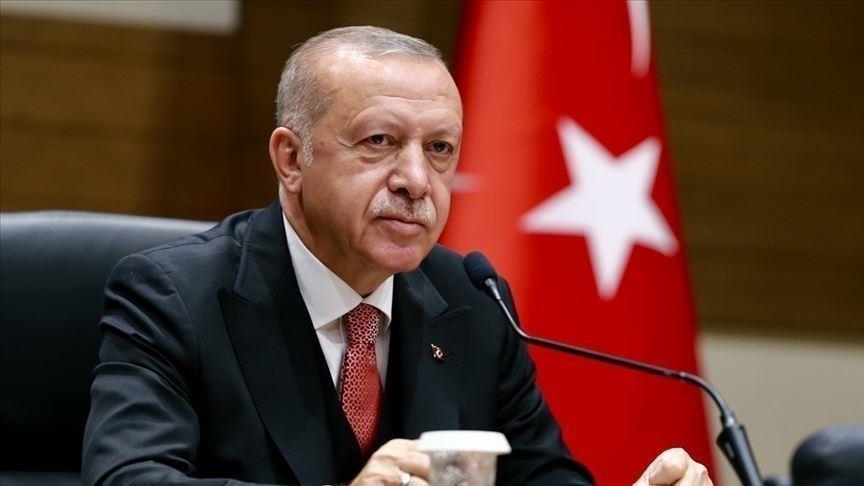
ANKARA
Ankara and Moscow will work jointly on building a natural gas hub in Türkiye's Thrace region after a Russian proposal earlier this week, according to Turkish President Recep Tayyip Erdogan.
"For such a distribution center, of course, Thrace is seen as the most important place for this business,” said Erdogan on Thursday, referring to a region in northwestern Türkiye, near the Greek border.
“Together with (Russian President Vladimir) Putin, we instructed our Energy and Natural Resources Ministry and the relevant institution on the Russian side to work together. They will do this work there," Erdogan told reporters on the presidential plane returning from a trip to Kazakhstan.
"Wherever the most appropriate place is, we will hopefully have established this distribution center there. We have a national distribution center, but of course, now this will be an international distribution center," Erdogan said.
On the sidelines of the Conference on Interaction and Confidence Building Measures in Asia summit in the Kazakh capital Astana, Erdogan earlier held a closed-door meeting with Putin, who had proposed building a natural gas hub in Türkiye.
Praising Türkiye as "the most reliable partner" for gas deliveries to Europe, Putin said building a hub in Türkiye would allow, among other things, regulating prices, selling gas at reasonable prices, and ruling out "politicization" of the issue.
On the ongoing Russia-Ukraine war, Erdogan also told reporters Ankara's mediation between the two countries continues.
"Concerning Türkiye's mediation, the trust Russia and some other countries have in Türkiye remains the same," Erdogan said, adding: "The continuing trust in Türkiye also pleased us."
Türkiye has been in close contact with both Russia and Ukraine since the beginning of the war. Erdogan has repeatedly stressed his wish to bring Putin and Ukrainian President Volodymyr Zelenskyy together at the negotiating table in Türkiye to end the war.
'We may come suddenly one night'
Asked about Greece's illegal militarization of Aegean islands with US support, Erdogan said: "Of course, we are making warnings about this."
Erdogan said on the sidelines of a NATO defense ministers meeting in Brussels this week, Turkish National Defense Minister Hulusi Akar held meetings with his US and Greek counterparts.
"Of course, we see what was done in Dedeagac (Alexandroupolis) or on various islands. After we put on our armor and take precautions, we have nothing to fear from them. We have precautions, everything is ready. So we’re taking our steps accordingly. Let them (Greece) think about it," he added.
The president has repeatedly warned Greece about the militarization of the islands, in violation of longstanding international treaties, saying, "We may come suddenly one night" without giving a timeframe.
'Something has changed in ties with US'
Erdogan said recent developments, especially regarding the sale of F-16 fighter jets, show that something has changed in Türkiye's relations with the US.
This week, in a development welcomed by Ankara, two amendments putting conditions on potential F-16 sales to Türkiye were reportedly removed from the Senate version of the relevant bill.
The conditions included requiring the US president to take steps to ensure the warplanes "are not used by Turkey for repeated unauthorized territorial overflights of Greece."
Erdogan also said that during his visit to New York last month to attend the UN General Assembly, he held talks with US senators.
"We have kept relations between them warm through talks, we do, and we will continue to do so," he added.
'No problems with opening of Zangezur corridor'
Erdogan said he held talks with Armenian Premier Nikol Pashinyan on the sidelines of an EU summit in the Czech capital Prague last week and that they also held inter-delegation meetings.
Türkiye and Armenia have been engaged in talks on normalizing ties.
"Regarding the Zangezur corridor, I do not see any problems," he stressed, referring to a planned route through Armenian territory to connect Azerbaijan and its exclave of Nakhchivan.
The region of Zangezur was part of Azerbaijan, but in the 1920s, the Soviets gave the region to Armenia, where it is now known as Syunik. This deprived Azerbaijan of its direct overland route to the Nakhchivan exclave.
For the corridor, Azerbaijan has focused on planned connections including motorways and a 43-kilometer (26.7-mile) railway.
Azerbaijan’s President Ilham Aliyev said in May that Baku agreed with Yerevan on establishing a corridor, including the construction of both railways and highways.
Following the completion of the railway, Azerbaijan will be able to reach Iran, Armenia, and Nakhchivan. The railway would also link Türkiye with Russia through Azerbaijan.








